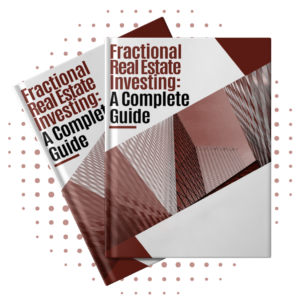
The global real estate crowdfunding market reached $8.3 billion in 2020 and is steadily becoming an increasingly popular platform for real estate funding and investing.
For an investor, it’s an easier, more democratized source of investment options. Where once access to large, profitable, shared real estate investments were reserved for the wealthy and connected, now anyone with as little as $10 (on some platforms) can get into a deal.
It can be a powerful real estate market investment approach but also comes with some risks and due diligence.
We’ve put together a guide to cover what you need to understand to take advantage of real estate crowdfunding, as well as some alternatives to consider.
Jump to a section:
What is Real Estate Crowdfunding?
Real estate crowdfunding is an attractive investment opportunity for both everyday and accredited real estate investors to diversify their portfolios. It works in much the same way as other crowdfunding ventures where investors pool their money to fund a company or a product and hope to see a return on that investment.
Every real estate crowdfunding platform is different but for the most part they all offer a lower barrier to entry than purchasing a physical property.
In most cases, investors may gain access to privately-owned Real Estate Investment Trusts (REITs) in addition to public traded REITs. Access to a private REIT lets investors gain access to investments that could offer higher returns. Depending on the real estate crowdfunding platform, a person may need to be an accredited investor (trusts, high net worth individuals, brokers, banks and insurance companies), as well as have the minimum investment limit.
The Pros of Real Estate Crowdfunding
Real estate investors enjoy crowdfunding opportunities due to the ease of using the online platform. They gain all the information they require upfront and can track their investments on their mobile phone, laptop, desktop computer, or tablet. Also, they do not have to purchase the property and become a landlord who manages tenants as well as maintenance.
Crowdfunding offers a chance to diversify a portfolio, especially when getting involved with REITs that can consist of a variety of related real-estate properties. There is the potential of obtaining high dividends, as REITs pay out 90% of taxable income. Lastly, many real estate crowdfunding platforms allow for low investment minimums.
How to Start Investing in Real Estate Crowdfunding
Getting started in real estate crowdfunding is a relatively simple process. If you’re planning to invest, you will want to do some shopping around before choosing the right option for you. Browse several different crowdfunding platforms to evaluate fees, account minimums, and term limits. You will also want to determine whether you need to be accredited.
Alternatives to Real Estate Crowdfunding
The variety of real estate crowdfunding platforms and typical investment options are not the only ways for a person to profit through real estate. Many crowdfunding investments require significant investment and at least 3-10 years until you see your capital back.
Mutual funds and REIT ETFs are securities and shares for investors looking for a more hands-off approach to investing while still allowing diversification.
Another option is traditional real estate purchases if you are looking to own a physical property to bring in passive income. You may also decide to get involved with standard market investments that include stocks and bonds.
Real Estate Mutual Funds (REITs)
While mutual funds invest in a variety of vehicles, including bonds and stocks, real estate mutual funds invest in REITs and operating companies. You can diversify your real estate portfolio with a broader selection of properties rather than just one type, such as REITs, with a small amount of capital.
By law REITs must pay dividends of at least 90% of their taxable income, so you may receive dividend income. However since nearly all REIT income must be distributed to investors, they generally have a hard time investing back into their current holdings, so capital appreciation can be slow.
What you can expect: better performance than stocks with a dividend yield of 5% or better.
Best for: Investors who need stable income or want to reinvest their money for gains that add up over time.
REIT ETFs
The REIT ETF model is a way for investors to earn consistent returns over time. While they may appear to be overly focused on the top REITs (such as Vanguard Real Estate Index Fund, Schwab U.S.REIT ETF and Ishares Global REIT ETF), those REITs have a track record of performing well and generating revenue.
Like REITs, the ETF must also distribute at least 90% of their earnings to shareholders in the form of dividends, making them excellent dividend investments. While sophisticated investors may want to concentrate on a single REIT, a more casual investor might be attracted to the ETF’s easy way to gain diversified exposure.
What you can expect: High dividends and long term growth plus portfolio diversification.
Best for: Anyone looking for the benefits of a REIT without having to shop around for the right one.
Tokenized Real Estate
As it pertains to real estate, “Tokenization” is an emerging trend. Tokenization is the process of creating a virtual securities token that represents ownership of a specific type of real estate asset. This is similar to non-fungible tokens ("NFTs"), except that the value of a real estate token is tied to the value of a physical asset.
Because tokenization is highly adaptable, the token can represent real estate ownership in a variety of ways, i.e., individual ownership; multi-person shared, partial ownership, and corporate ownership. The overall type of real estate that can be tokenized can vary, just as it does with traditional real estate.
Since physical assets would back these real estate security tokens, the value of the tokens fluctuates based on the asset's performance (i.e., based on supply and demand), similar to traditional real estate investing, but with the ease of transfer provided by blockchain technology and a more liquid marketplace and aftermarket.
What you can expect: Greater liquidity. The opportunity for more fractionalized real estate ownership. Increased access to private and commercial real estate investments. Dramatically greater transparency and a much more efficient market/aftermarket.
Best For: Anyone looking for a relatively safe and easy way to buy, sell, invest in, and own tangible real estate assets with lower fees and greater liquidity.
EquityBrix Real Estate Investment Funds
EquityBrix is a unique real estate investment that differs from a REIT and crowdfunding as a more flexible investment option that you can access funds when needed.
There is a low minimum investment of $25 (or $1,000 depending on your state of residence) with high yield rates starting at 2.06% that could reach up to 5.06% with higher investment and a longer investment lock period.
EquityBrix offers floating rate demand notes that have adjusted quarterly rates which pay 2% more than the interest rates found on regular bank savings accounts.
EquityBrix investments are secured by performing real estate properties.
What you can expect: Moderate returns that exceed typical savings accounts yet similar easy access to money.
Best for: Investors who want to retain fluidity and flexibility while earning better rates of return than traditional savings accounts.
Conclusion
Having a range of investment options allows you to diversify and select the investment vehicles that best align with your personal financial needs and goals. Check out all the online real estate investment solutions, including real estate crowdfunding opportunities to determine what’s best for you.
EquityBrix can help you grow your wealth through our fractional real estate investment platform. Our team marries the needs of investors and real estate developers by providing opportunities for above-market returns. EquityBrix is committed to creating high-yield investment offerings, and we can help guide you through the new era of real estate investing.
If you want more information about tokenized real estate investing go to EquityBrix or EquityBrix.com/Learn.
If you are looking to grow your wealth and diversify your investment portfolio by learning about innovative ways of investing in real estate go to EquityBrix, or contact us for more information, or sign-up for the EquityBrix Newsletter.
*Disclaimer: EquityBrix is not an investment adviser. This information is for educational purposes only and does not constitute investment or tax advice. It’s important to be informed and to make your own investment decisions or do so in consultation with a professional financial advisor. Under no circumstances should this material be used or considered as an offer to sell or a solicitation of any offer to buy an interest in any investment. Any such offer or solicitation will be made only by means of a written online prospectus relating to the particular investment.
FAQs
Can you lose money with real estate crowdfunding?
Like any real estate investment, there are risks involved. There are also no guaranteed returns.
What does crowdfunding mean in real estate?
Crowdfunding means that investors pool their money together to make real estate investment purchases, either buying physical properties, securities, bonds, or other potential investment vehicles. It involves finding these investments over online platforms.
Can you crowdfund a property?
Yes. You can crowdfund a property depending on the platform and the number of funds that you have available for the investment. Some platforms allow for non-accredited investors to fund projects.

